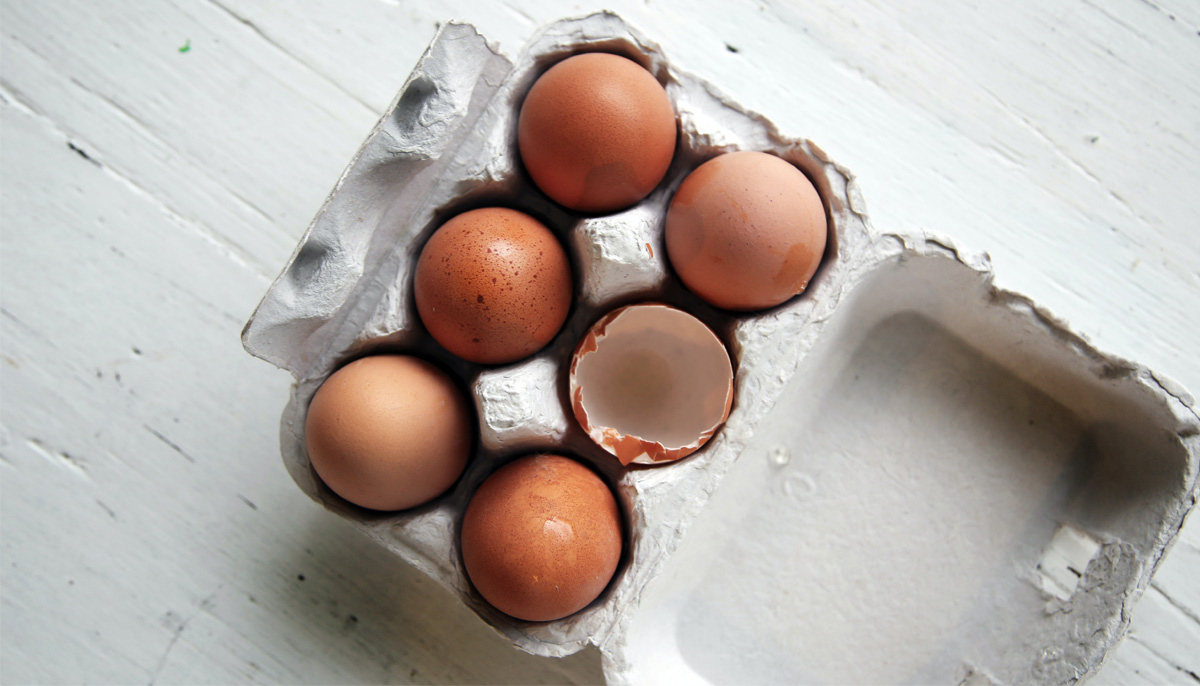I couldn’t peel it; my hands shook.
I ran them under cool water and dried them on my favorite blue striped linen towel hanging off the oven door handle — the one that I never use because I’m afraid of staining it lest it cease being the fresh, perfect towel that it is. Still, my hands trembled, and when I attempted to peel that morning’s freshly boiled egg, I failed. I tried to brush the shell away with my thumbs, coaxing it off like my grandmother when she used to make eggs for me in the chipped, black and white enamel saucepan of my childhood. Instead, I gouged it, my thumb piercing straight through shell, membrane, glair, and the crumbling orange yolk with its halo of telltale overcooked green. All that was left of the egg was the suggestion of nourishment.
When you make an egg for your morning breakfast, make an egg for your morning breakfast. Don’t walk away.
“We call one another good eggs, tough or rotten eggs…We walk on eggs to spare fragile egos….” said the author Robert Farrar Capon. I add to this the egg’s subtext of Life, capital L, and hope: In The English Patient, when David Caravaggio, erstwhile spy and thumbless thief produces a single, purloined fresh egg for the nurse, Hana, it means that the war is nearly over. When he drops it and it splatters at his feet, we know that the war will continue, however briefly, and more will die. Eggs, treated with respect and care, are perhaps the world’s most simple, mundane, and perfect food, symbolic of the maternal. Eggs, treated without respect and care, are also symbolic of death.
My egg that morning was no ordinary egg, and if you have eggs in your refrigerator, you too have no ordinary eggs. There are, in fact, no ordinary eggs. Every egg is a special egg; every egg is a good egg. I often return home from a hike to discover a bowl of fresh eggs sitting on my front steps, gifted to me from my beloved neighbor, or rather, her hens who have become as much a part of my neighborhood as any of us. Of wildly differing size and shape (one girl used to have a tendency to lay long, flat eggs), they taste like onion in the early summer when wild chives begin to poke through the grass, and their yolks go snow white in the winter.
The egg through which I had poked my thumb had arrived at my home a few days earlier with eleven others, some stray feathers, and other detritus still in evidence. I had chosen it, placed it in my favorite egg pot, filled it with water, brought it to a boil, turned it off, slapped on a cover, and walked away to do something else. When I remembered it, almost an hour later, it was overcooked, cold, and disrespected.
“To cook, or to fix food, is not preparation, according to Dogen; it is practice,” wrote Shunryu Suzuki in Zen Mind, Beginner’s Mind. When you chop, chop. When you cook, cook. When you make an egg for your morning breakfast, make an egg for your morning breakfast. Don’t walk away.
On the morning of my broken boiled egg, I learned my lesson. It took half an hour of painstaking peeling to remove the shattered shell. I placed it in a bowl, sprinkled it with sea salt, sat down at my breakfast table, and ate it slowly.
A Perfect Hard-Boiled Egg
There as many different methods for cooking hard boiled eggs as there are cooks. This is the most gentle and effective way, if you don’t leave the kitchen the way I did. While the timer ticks, do not read the paper, or brew your coffee, or make your tea. Just wait for your egg.
Note: If your eggs are very fresh — a gift, perhaps, from chickens you are acquainted with — they will be difficult to peel. Add a teaspoon of baking soda to the water to make the process easier.
- 1 large fresh egg, organic if possible
Place the egg in a small pot of water and bring to a boil. Immediately shut the burner off, and cover the pot. Set a timer for eleven minutes. When done, drain the pot and run cool water over the egg. Dry, and peel.

